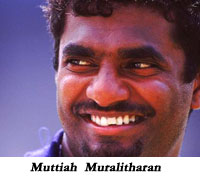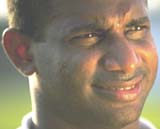Sri Lanka poised to become next Test power
Daniel Laidlaw
Last week, Rediff posed the question of whether Australia is in a one-horse
race or if any of Sri Lanka, New Zealand, Pakistan, England or India can
challenge their supremacy. With Australia in a class of their own and South
Africa probably still occupying the next spot, the challenge is not so much
to identify a candidate to match the current Australian side, who may be one
of the all-time great teams, but the next rising force in Test cricket.
In the world league of Test nations, England and New Zealand are reasonable
and well-led sides, India might be gradually improving and Pakistan are
Pakistan. But of the middle-tier group, it is Sri Lanka that stands out as
having the greatest potential to become the next Test power.
 The third-youngest Test nation after Bangladesh and Zimbabwe, Sri Lanka have
quietly grown in stature in recent times. The 1996 World Cup winners, ranked
third on the ICC Test Championship table, are already a force at home. On
the back of the incredible form of super-spinner Muttiah Muralitharan, Sri
Lanka are currently riding a 9-Test winning streak, with wins over Zimbabwe,
West Indies and India. Muralitharan claimed a stunning 83 wickets during
that span.
The third-youngest Test nation after Bangladesh and Zimbabwe, Sri Lanka have
quietly grown in stature in recent times. The 1996 World Cup winners, ranked
third on the ICC Test Championship table, are already a force at home. On
the back of the incredible form of super-spinner Muttiah Muralitharan, Sri
Lanka are currently riding a 9-Test winning streak, with wins over Zimbabwe,
West Indies and India. Muralitharan claimed a stunning 83 wickets during
that span.
With a series victory over India last August and defeat of Pakistan in the
Asian Championship final in March, Sanath Jayasuriya's men have confirmed
themselves as the best team in Asia. After Australia, they are also the
world's most in-form Test team, yet of the contending pack they are still
the most under-rated.
While Muralitharan is Sri Lanka's undisputed match-winner, they do have
other significant assets. Behind Murali, Sri Lanka possess quality fast
bowlers in Chaminda Vaas, Nuwan Zoysa and Dilhara Fernando, consistent and
reliable batsmen like Marvan Atapattu, Mahela Jayawardene and Kumar
Sangakkara, and the excellent leadership duo of captain Sanath Jayasuriya
and coach Dav Whatmore. It's a salubrious combination, but one that did not
develop by accident.
After storming to victory at the '96 World Cup, Sri Lanka declared they
intended to become Test champions by the year 2000. That was a lofty
ambition for the minnows and one which unsurprisingly proved impossible to
fulfil. Nevertheless, it was an indication of the commitment to excellence
which has seen Sri Lanka rise to prominence despite a perennially unstable
cricket board.
Former captain Arjuna Ranatunga's fearlessness and belligerence is credited
with facilitating Sri Lanka's rise but the role of coach Dav Whatmore should
not be underestimated, either. It was Whatmore who was at the helm for Sri
Lanka's historic World Cup triumph in 1996, but he was later sacked for
reputed differences with the powerful Ranatunga. Sri Lanka's Daily News was
reported to have said that Ranatunga and other senior players felt
threatened by Whatmore's plan to prepare a younger squad, which apparently
led to his ousting. Unfortunately for Sri Lanka, as it turned out they would
have been better served by axing the captain rather than the coach, as a
disastrous defence of their World Cup title at the '99 event saw them
eliminated before the Super Six stage.
Whatmore's reappointment following that debacle coincided with Ranatunga's
departure as skipper, with new captain Jayasuriya saying of Whatmore's
appointment in the Daily News : "He does not mess around too much with the
players, but gives them vital tips at various stages of the game and makes
us mentally strong." Sri Lanka responded to the leadership changes by
upsetting Australia in their first series under Jayasuriya and Whatmore
later that year, and immediate improvement was evident.
 Since Jayasuriya and Whatmore took over, Sri Lanka have won 16 Tests, lost 9
and drawn 7. While Sri Lanka built their reputation through one-day cricket
and remain consistently strong in that form of the game, they appear to
recognise that it is in the Test arena where true merit lies. Thus, Whatmore
and Jayasuriya are building a team that is not only talented but tough and
disciplined, critical for sustained Test achievement. So what is preventing
them from receiving the wider respect they seemingly deserve?
Since Jayasuriya and Whatmore took over, Sri Lanka have won 16 Tests, lost 9
and drawn 7. While Sri Lanka built their reputation through one-day cricket
and remain consistently strong in that form of the game, they appear to
recognise that it is in the Test arena where true merit lies. Thus, Whatmore
and Jayasuriya are building a team that is not only talented but tough and
disciplined, critical for sustained Test achievement. So what is preventing
them from receiving the wider respect they seemingly deserve?
The remaining hurdle for Sri Lanka to overcome is proving themselves away
from home. Of the 9-Test winning streak, eight of the wins were at home, and
while that is still meritorious, they cannot hope to receive wider respect
until they register some away series wins.
On Sri Lanka's last major away tour against South Africa in 2000/'01, they
were comprehensively beaten 2-0, the batting not standing up to the Proteas'
fast bowlers as they were rolled by an innings inside three days of the
second and third Tests. The only way to achieve increased recognition is to
start winning the premiere away series, and the first opportunity is against
a highly competitive England next month.
However, Sri Lanka can hardly be blamed for not having beaten better teams
abroad when they have been denied regular opportunities to even meet those
sides. In the past decade, Sri Lanka have been invited to Australia and West
Indies for a Test series just once, the latter for only two Tests. England
have been even less accommodating, deigning to host Sri Lanka for just a
single 1-Test "series" in 1998, in which the hosts were embarrassingly
beaten. Disgracefully, Sri Lanka's forthcoming three-Test series will be the
first full Test tour of England in their 20-year history.
With the right structure in place, greater experience in foreign conditions
should eventually lead to improved results, and Whatmore appears to have a
vision of how to achieve them. With thoughts of the World Cup omnipresent,
Whatmore believes that the development fast bowling all-rounders is the key
to winning in 2003. "We would like to play an additional fast bowler in
place of the seventh batsman wherever possible," Whatmore wrote on CricInfo
last year. "To win in South Africa we will need greater depth in our fast
bowling resources and some of those will have to make significant
contributions with the bat.
"A quick look around the world will show you that the successful teams that
play in South Africa, Australia and England have bowling attacks stacked
full of fast bowlers who can bat or batsmen that bowl seam up. Australia,
South Africa, New Zealand, and Pakistan all usually play one specialist
spinner in these conditions. This is the global trend and is clearly the way
to go for sustained success in more temperate environs."
The same principle applies to Test cricket, with Sri Lanka placing emphasis
on playing fast bowlers like Buddika and Dilhara Fernando with the objective
of preparing for overseas success, balancing the needs of the present with
long-term improvement. Before last year's series against India, Whatmore
wrote: "There is now the basis of a very strong Sri Lankan Test team and I
don't even believe that the players themselves really understand how good
they can be. With a little more self-belief I have no doubt that the
building blocks for sustained success are there."
Sri Lanka's results since
then have certainly supported that view. "We have always had the ability to
be as good as anyone in the world, but in the past we would throw away Test
matches with bad sessions and days," Whatmore said this year.
Constantly seeking long-term development, Whatmore has had Sri Lanka
practice on green surfaces where the ball jags off the seam. "The objective
was simple: we want the batsmen to learn how to survive in conditions where
the ball is darting around. The key to this is not playing at the ball away
from the body. Playing and missing is fine, but you must not follow the
ball. Survival against the moving ball requires a more compact technique and
the more practice the players have under those conditions the better they
will become."
In line with the growing self-belief of Sri Lanka's players, Muttiah
Muralitharan is confident of his team's prospects. "At home I think we are
second only to Australia now, but we have to prove ourselves in England and
South Africa," he told CricInfo after the series against Zimbabwe. "I think
we can seriously think of winning overseas because the side is playing as a
team and a number of good fast bowlers are now coming through."
After the series in England from next month, Sri Lanka are scheduled to tour
South Africa in October. How they perform in these places will determine how
quickly Sri Lanka become the Test force that seems their destiny.
More Columns
Mail Daniel Laidlaw